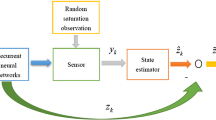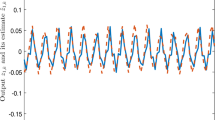Abstract
This paper discusses the issue of partial-neurons-based \(H_{\infty }\) state estimation for time-varying recurrent neural networks subject to randomly occurring time delays under variance constraint index. The measurement outputs are allowed to be available only at certain neurons. In addition, a random variable is introduced to model the randomly occurring time delays with certain occurrence probability. The aim is to propose the non-augmented partial-neurons-based state estimation strategy. Accordingly, some sufficient conditions are given to ensure two indices including the pre-determined \(H_{\infty }\) performance index and the error variance boundedness via the stochastic analysis approach. Finally, a simulation example is used to demonstrate the feasibility of presented partial-neurons-based \(H_{\infty }\) state estimation algorithm.






Similar content being viewed by others
References
Peng T, Lu J, Tu Z, Lou J (2022) Finite-time stabilization of quaternion-valued neural networks with time delays: an implicit function method. Inf Sci 613:747–762
Ding Y, Fu M, Luo P, Wu FX (2023) Network learning for biomarker discovery. Int J Netw Dyn Intell 2(1):51–65
Wang M, Wang H, Zheng H (2022) A mini review of node centrality metrics in biological networks. Int J Netw Dyn Intell 1(1):99–110
Tanaka G, Nakane R, Takeuchi T, Yamane T, Nakano D, Katayama Y, Hirose A (2020) Spatially arranged sparse recurrent neural networks for energy efficient associative memory. IEEE Trans Neural Netw Learn Syst 31(1):24–38
Demin VA, Nekhaev DV, Surazhevsky IA, Nikiruy KE, Emelyanov AV, Nikolaev SN, Rylkov VV, Kovalchuk MV (2021) Necessary conditions for STDP-based pattern recognition learning in a memristive spiking neural network. Neural Netw 134:64–75
Li X, Li M, Yan P, Li G, Jiang Y, Luo H, Yin S (2023) Deep learning attention mechanism in medical image analysis: basics and beyonds. Int J Netw Dyn Intell 2(1):93–116
Yao F, Ding Y, Hong S, Yang S-H (2022) A survey on evolved LoRa-based communication technologies for emerging internet of things applications. Int J Netw Dyn Intell 1(1):4–19
Schuetz MJA, Brubaker JK, Katzgraber HG (2022) Combinatorial optimization with physics-inspired graph neural networks. Nat Mach Intell 4(4):367–377
Bao G, Ma L, Yi X (2022) Recent advances on cooperative control of heterogeneous multi-agent systems subject to constraints: a survey. Syst Sci Control Eng 10(1):539–551
Li J, Wang Z, Dong H, Ghinea G (2021) Outlier-resistant remote state estimation for recurrent neural networks with mixed time-delays. IEEE Trans Neural Netw Learn Syst 32(5):2266–2273
Zou C, Li B, Du S, Chen X (2021) \(H_{\infty }\) state estimation for round-robin protocol-based Markovian jumping neural networks with mixed time delays. Neural Process Lett 53(6):4313–4330
Li H, Wu P, Zeng N, Liu Y, Alsaadi FE (2022) A survey on parameter identification, state estimation and data analytics for lateral flow immunoassay: from systems science perspective. Int J Syst Sci 53(16):3556–3576
Zhao Y, He X, Ma L, Liu H (2022) Unbiasedness-constrained least squares state estimation for time-varying systems with missing measurements under round-robin protocol. Int J Syst Sci 53(9):1925–1941
Yu Y, Dong H, Wang Z, Li J (2019) Delay-distribution-dependent non-fragile state estimation for discrete-time neural networks under event-triggered mechanism. Neural Comput Appl 31(11):7245–7256
Hou N, Dong H, Wang Z, Ren W, Alsaadi FE (2016) Non-fragile state estimation for discrete Markovian jumping neural networks. Neurocomputing 179:238–245
Shen Y, Wang Z, Shen B, Alsaadi FE (2020) \(H_{\infty }\) state estimation for multi-rate artificial neural networks with integral measurements: a switched system approach. Inf Sci 539:434–446
Qu Y, Pang K (2020) State estimation for a class of artificial neural networks subject to mixed attacks: a set-membership method. Neurocomputing 411:239–246
Meng X, Chen Y, Ma L, Liu H (2022) Protocol-based variance-constrained distributed secure filtering with measurement censoring. Int J Syst Sci 53(15):3322–3338
Wang L, Liu S, Zhang Y, Ding D, Yi X (2022) Non-fragile \(l_{2}\)-\(l_{\infty }\) state estimation for time-delayed artificial neural networks: an adaptive event-triggered approach. Int J Syst Sci 53(10):2247–2259
Wang X, Sun Y, Ding D (2022) Adaptive dynamic programming for networked control systems under communication constraints: a survey of trends and techniques. Int J Netw Dyn Intell 1(1):85–98
Sakthivel R, Devi NB, Harshavarthini S, Kwon O (2022) Disturbance estimation and synchronization control design for nonlinear complex dynamical networks with input delays. Int J Robust Nonlinear Control 32(7):4281–4299
Feng S, Yu H, Jia C, Gao P (2022) Joint state and fault estimation for nonlinear complex networks with mixed time-delays and uncertain inner coupling: Non-fragile recursive method. Syst Sci Control Eng 10(1):603–615
Zhu Q (2019) Stabilization of stochastic nonlinear delay systems with exogenous disturbances and the event-triggered feedback control. IEEE Trans Autom Control 64(9):3764–3771
Zhu Q, Huang T (2021) \(H_{\infty }\) control of stochastic networked control systems with time-varying delays: the event-triggered sampling case. Int J Robust Nonlinear Control 31(18):9767–9781
Tian Y, Yan H, Zhang H, Cheng J, Shen H (2022) Asynchronous output feedback control of hidden semi-Markov jump systems with random mode-dependent delays. IEEE Trans Autom Control 67(8):4107–4114
Suo J, Li N (2022) Observer-based synchronisation control for discrete-time delayed switched complex networks with coding-decoding approach. Int J Syst Sci 53(13):2711–2728
Yu L, Cui Y, Liu Y, Alotaibi ND, Alsaadi FE (2022) Sampled-based consensus of multi-agent systems with bounded distributed time-delays and dynamic quantisation effects. Int J Syst Sci 53(11):2390–2406
Suo J, Li N, Li Q (2021) Event-triggered \(H_{\infty }\) state estimation for discrete-time delayed switched stochastic neural networks with persistent dwell-time switching regularities and sensor saturations. Neurocomputing 455:297–307
Qian W, Xing W, Fei S (2021) \(H_{\infty }\) state estimation for neural networks with general activation function and mixed time-varying delays. IEEE Trans Neural Netw Learn Syst 32(9):3909–3918
Zhao D, Wang Z, Wei G, Liu X (2021) Nonfragile \(H_{\infty }\) state estimation for recurrent neural networks with time-varying delays: On proportional-integral observer design. IEEE Trans Neural Netw Learn Syst 32(8):3553–3565
Wang Y, Cao J, Wang H (2021) State estimation for Markovian coupled neural networks with multiple time delays via event-triggered mechanism. Neural Process Lett 53(2):893–906
Cao Y, Maheswari K, Dharani S (2023) Improved summation inequality based state estimation for stochastic semi-Markovian jumping discrete-time neural networks with mixed delays and quantization. Neural Process Lett. 55(2):1919–1935
Yu Y, Dong H, Wang Z, Ren W, Alsaadi FE (2016) Design of non-fragile state estimators for discrete time-delayed neural networks with parameter uncertainties. Neurocomputing 182:18–24
Song Y, Hu J, Chen D, Liu Y, Alsaadi FE, Sun G (2018) A resilience approach to state estimation for discrete neural networks subject to multiple missing measurements and mixed time-delays. Neurocomputing 272:74–83
Liu F, Song Q, Wen G, Cao J, Yang X (2018) Bipartite synchronization in coupled delayed neural networks under pinning control. Neural Netw 108:146–154
Yang X, Song Q, Liang J, He B (2015) Finite-time synchronization of coupled discontinuous neural networks with mixed delays and nonidentical perturbations. J Frankl Inst-Eng Appl Math 352(10):4382–4406
Li J, Wang Z, Dong H, Fei W (2020) Delay-distribution-dependent state estimation for neural networks under stochastic communication protocol with uncertain transition probabilities. Neural Netw 130:143–151
Ding S, Wang Z, Wang J, Zhang H (2016) \(H_{\infty }\) state estimation for memristive neural networks with time-varying delays: the discrete-time case. Neural Netw 84:47–56
Gao Y, Hu J, Yu H, Du J, Jia C (2023) Variance-constrained resilient \(H_{\infty }\) state estimation for time-varying neural networks with random saturation observation under uncertain occurrence probability. Neural Process Lett. https://doi.org/10.1007/s11063-022-11078-z
Liu Y, Wang Z, Yuan Y, Liu W (2019) Event-triggered partial-nodes-based state estimation for delayed complex networks with bounded distributed delays. IEEE Trans Syst Man Cybern-Syst 49(6):1088–1098
Hou N, Dong H, Wang Z, Liu H (2021) A partial-node-based approach to state estimation for complex networks with sensor saturations under random access protocol. IEEE Trans Neural Netw Learn Syst 32(11):5167–5178
Hou N, Wang Z, Ho DWC, Dong H (2020) Robust partial-nodes-based state estimation for complex networks under deception attacks. IEEE Trans Cybern 50(6):2793–2802
Liu Y, Wang Z, Ma L, Alsaadi FE (2019) A partial-nodes-based information fusion approach to state estimation for discrete-time delayed stochastic complex networks. Inf Fus 49:240–248
Wang L, Zhao D, Wang Y-A, Ding D, Liu H (2022) Partial-neurons-based state estimation for artificial neural networks under constrained bit rate: the finite-time case. Neurocomputing 488:144–153
Li J, Dong H, Wang Z, Bu X (2020) Partial-neurons-based passivity-guaranteed state estimation for neural networks with randomly occurring time delays. IEEE Trans Neural Netw Learn Syst 31(9):3747–3753
Liu S, Wang Z, Shen B, Wei G (2021) Partial-neurons-based state estimation for delayed neural networks with state-dependent noises under redundant channels. Inf Sci 547:931–944
Shen B, Wang Z, Shu H, Wei G (2011) \(H_{\infty }\) filtering for uncertain time-varying systems with multiple randomly occurred nonlinearities and successive packet dropouts. Int J Robust Nonlinear Control 21(14):1693–1709
Author information
Authors and Affiliations
Contributions
Jun Hu and Yan Gao wrote the main manuscript text and prepared figures. Cai Chen did the simulation. All authors reviewed the manuscript
Corresponding author
Ethics declarations
Conflict of interest
The authors declare that they have no conflict of interest.
Additional information
Publisher's Note
Springer Nature remains neutral with regard to jurisdictional claims in published maps and institutional affiliations.
This work was supported in part by the National Natural Science Foundation of China under Grant 12171124, the Natural Science Foundation of Heilongjiang Province of China under Grant ZD2022F003, the Postdoctoral Science Foundation of Heilongjiang Province of China under Grant LBH-Z22199, the Fundamental Research Funds in Heilongjiang Provincial Universities of China under Grant 135509121, the Educational Research Project of the Qiqihar University of China under Grant YB201904, and the Alexander von Humboldt Foundation of Germany.
Rights and permissions
Springer Nature or its licensor (e.g. a society or other partner) holds exclusive rights to this article under a publishing agreement with the author(s) or other rightsholder(s); author self-archiving of the accepted manuscript version of this article is solely governed by the terms of such publishing agreement and applicable law.
About this article
Cite this article
Hu, J., Gao, Y., Chen, C. et al. Partial-Neurons-Based \(H_{\infty }\) State Estimation for Time-Varying Neural Networks Subject to Randomly Occurring Time Delays under Variance Constraint. Neural Process Lett 55, 8285–8307 (2023). https://doi.org/10.1007/s11063-023-11312-2
Accepted:
Published:
Issue Date:
DOI: https://doi.org/10.1007/s11063-023-11312-2




